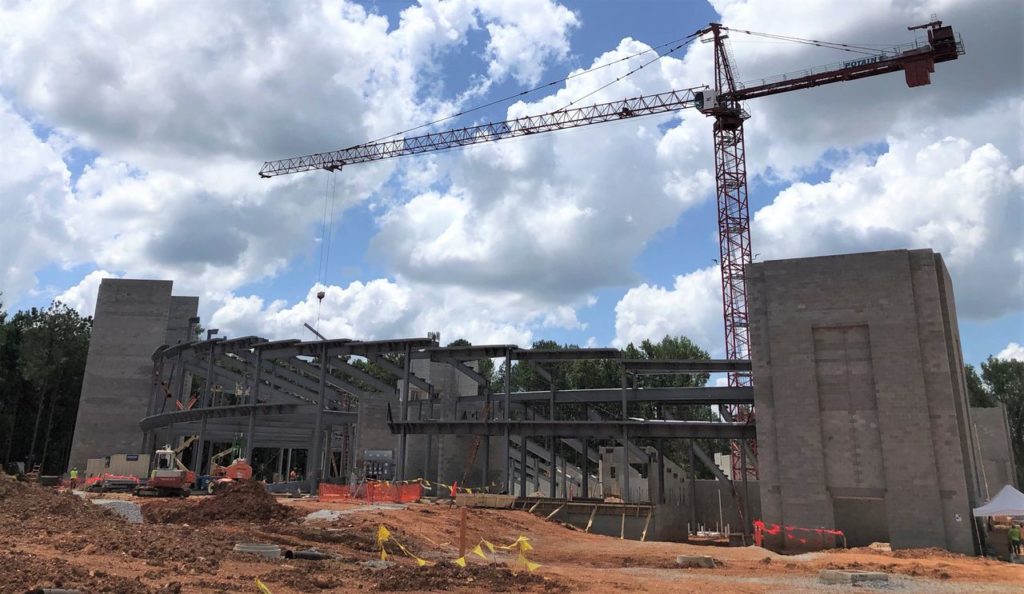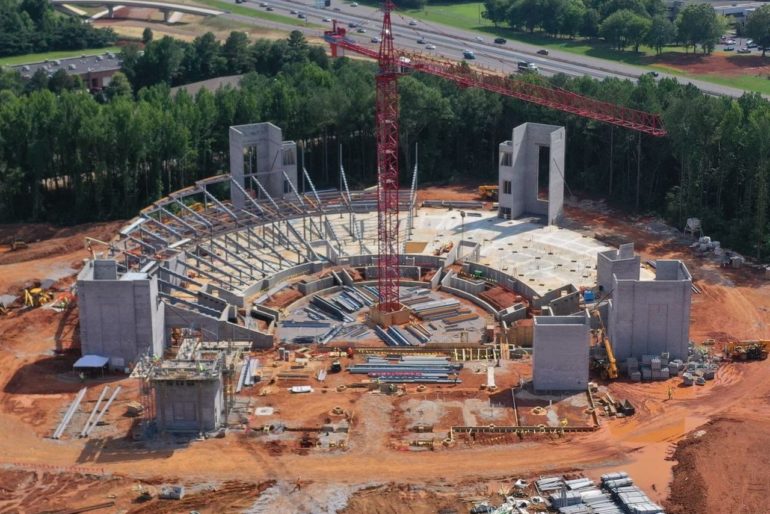By Matt Wake | [email protected] | AL.com
Andrew Seward shows me his left forearm, which is covered in tattoos. Right now, his forearm’s also covered in goosebumps.
We’re standing on red clay and looking at the steel and concrete skeleton of the Huntsville Amphitheater, which is really starting to look like an amphitheater now – and not just some random construction site for a strip mall or something.
“I’ve been to many, many, many venues as patron and performer,” Seward says. “And just to see something like this and be part of it from the ground up … Goosebumps every time.”
As punk band Against Me!’s longtime bassist, Seward has played huge festival gigs at Bonnaroo and Coachella. Opened for Foo Fighters at London’s famed Wembley Stadium. He’s also now assistant general manager of Huntsville Venue Group, the firm contracted to lead, build and operate the amphitheater. Although Against Me! was formed in Florida, Seward’s a Huntsville native. It’s here he joined his first punk band, called The Jawas, as a kid. He graduated from Grissom High School in 1996.
The amphitheater site is located at the back of the MidCity development, off University Drive and on the former grounds of Madison Square Mall. After Huntsville Public Works prepared the site in fall 2020, Birmingham-based construction firm Robins & Morton began work on the actual amphitheater in January.
Most days, around 75 hardhat-wearing workers are onsite building the amphitheater. Progress has been accelerating lately Seward says. “When I first came on the job April, nothing was going vertical yet.”
Huntsville Venue Group president/general manager Ryan Murphy believes the amphitheater project is about a third of the way done. The venue is expected to open and begin hosting concerts and events late spring/early summer next year. Murphy says they’re on target.
“I think once you hit the top of next year, it’s a sprint,” Murphy tells me. “So right now there’s just a steady chugging forward getting this thing built. And the contractor’s doing a great job. It’s a pretty aggressive timeline, to get it done in like 15 months or so. And so you’re six months into that.”

Today, there’s a gigantic red crane lifting steel girders into place, fleshing out the venue’s contours. You can see the different seating sections taking shape as well as the amphitheater’s coliseum-esque, bowl-shaped design. It’s the project’s signature look.
Standing on the ground where the stage will be, one can almost see the fans in the stands across the way. And feel the ecstasy and sorcery musicians onstage will wield here. Because of the vertically-oriented bowl design, for an 8,000-ish capacity venue it’s going to be a surprisingly intimate place to watch or play a concert.
“There’s not going to be a bad seat in the house,” Seward says. In addition to classic aesthetics, the bowl design is intended to help contain concert-level sound volume. The stage is situated so sound will shoot out towards Research Park, Huntsville’s renowned science and technology business area, and not neighborhoods.

“It’s going to capture a lot in the bowl,” Seward says. “We’re spending a good amount and having the foresight to put in a lot of acoustic treatment to mitigate the sound, so it’s not just slapping off metal.” Architects for the Huntsville Amphitheater include Huntsville’s Matheny Goldmon, whose fingerprints are on city landmarks including Von Braun Center’s Propst Arena and Mars Music Hall, and Washington’s David M. Schwarz Architects Inc.
The next construction milestone is Aug. 10. That’s when Robins & Morton – whose past projects include Birmingham’s Regions Field baseball stadium and Auburn University’s basketball arena – will start setting precast, forming the audience seats around the amphitheater bowl. It will be all bench seating, along with the standing-room-only pit in front of the proscenium-topped stage. Behind the stage house, which as name implies houses the stage, lighting grid, etc., will be the backstage area and dressing rooms.
There will be at least a couple routes fans can take when driving to the amphitheater. One, courtesy of a new slip being built off Research Park Boulevard, will flow into a major parking area, Murphy says. There will also be distributed parking throughout the site’s east side. The amphitheater will be set amid a new city park. Visitors will also be able to access the amphitheater and that park by turning off of University Drive, accessible from I-565 via Research Park Boulevard.
Ticketholders for amphitheater concerts will receive real-time updates via text message and email regarding traffic and parking. “Let’s say you had two tickets to go see Robert Plant,” Murphy says, referring to the leonine, legendary Led Zeppelin frontman. “You’re getting ready to go to the show and you’ll get a notification, ‘To avoid traffic, take Hwy. 72, go to Wynn Drive, find a parking lot to the east and show your prepaid parking pass.’ We’re going to have a little smarter technology, so you’re not parking in someone’s lawn.”
RELATED: City of Huntsville hiring ‘music officer,’ with salary up to $89,211
Soon, Huntsville Venue Group will release food and beverage plans for the amphitheater, including different bars and food concepts throughout the venue, as well as for a “food village,” which will be the conduit between the park and the amphitheater.
The amphitheater’s backstage design and aesthetics will also be unveiled. “It’s going to be very cool, very Huntsville, very North Alabama,” Murphy says. Much of the amphitheater build’s tail is “commissioning electricity, the plumbing, making sure the green rooms have the right furniture and that fridges are plugged in. Stuff like that.”
The amphitheater is “holding a ton of dates for concerts,” Murphy says. “We have an amazing lineup congealing.” Those shows will be meshed with programming – including farmers markets, festivals, graduation ceremonies, local music showcases, etc. – to make the amphitheater a community hub and not just some big place that has concerts every once and a while. HVG’s contract for the city requires a certain number of large-scale concerts a year, building from around six or so the first year, and eventually up to about 16, etc.
RELATED: 10 bands perfect for Huntsville Amphitheater’s first concert
The Huntsville Amphitheater will be a city-owned facility, similar to the Von Braun Center. Huntsville receives profits from amphitheater operation, including renting the venue to promoters and bands, bar revenue, sponsorship revenue, etc. Huntsville Venue Group receives a flat fee, around five percent, for its services.
In October, Huntsville City Council authorized the project, with a $40 million budget. By comparison, neighboring Madison’s minor league baseball stadium cost around $46 million. Amphitheater construction is funded through the City of Huntsville’s capital plan and a percentage of future lodging taxes. AL.com broke the news of Huntsville’s amphitheater ambitions in April 2018.
Murphy promised City of Huntsville leaders the community events facet throughout the venue’s approval process. And he’s made it happen before, elsewhere. Community events were a hallmark of his previous stint running St. Augustine Amphitheater in Florida – in addition to bringing in top acts ranging from Kendrick Lamar to Blondie to Slayer to, yes, Robert Plant, to St. Augustine, which like Huntsville is a tertiary market.
“I’m not going to underplay how exciting all the concerts are going to be,” Murphy says of Huntsville Amphitheater’s first-year lineup. “But to me, the year round community partnerships we’re going to do here, that’s going to be the fun part.” In August, Huntsville Venue Group is bringing in a community programming manager to help manifest all that.
RELATED: 25 concerts coming to Huntsville in 2021
Currently, HVG employs a staff of around six. Soon it will be up to a dozen and by the time the amphitheater opens, around 20. For a while, staff will work out of a trailer onsite. But that’s temporary. HVG just signed a lease to take over the top floor of the old Huntsville Times building at the corner of Holmes Avenue and Greene Street downtown.
So what about the venue’s name? Is the appellation going to remain simply Huntsville Amphitheater as it’s been referred to for a while? Or is it going to be rechristened, say, Redstone Federal Credit Union Amphitheater? Or perhaps Alexander Shunnarah Trial Attorneys Amphitheater? If you’ve been to a concert in the last 20 years, you know what I mean.
“The day and age of that is kind of passing,” Murphy tells me. “Just write a big check to put your name on a building and then three or five years later someone else does it. Instead, I think a lot of partnerships are evolving towards programming or activations.”
In the Huntsville Amphitheater’s case, the naming process, Murphy says, is “an ongoing conversation of what we feel is the best approach for this and what’s best for the legacy of the venue and for the city. We’re going to have strong partners who want to be part of this and have their name aligned with us. That doesn’t always align itself with you get your name on the building.”
Recently, Murphy traveled to Florida to see Grammy-winning folk and rock musician and Jason Isbell perform at St. Augustine Amphitheater. He says Isbell, a North Alabama native, and his team have been involved with the amphitheater for a while, from a distance, contributing input and excitement. Backstage in St. Augustine, they were interested in seeing the project’s latest updates.
Isbell was the first concert Murphy had seen since the pandemic began. Isbell was also the last concert he saw – last January at Huntsville’s Mars Music Hall – before the touring business got knocked on its shell. In St. Augustine, at a packed house with a hot band wailing onstage, Murphy was grateful to be back in his natural habitat. “It was that overwhelming feeling,” he says, “of everyone looking at each other and hugging each other and being like, ‘We’re back.’”

